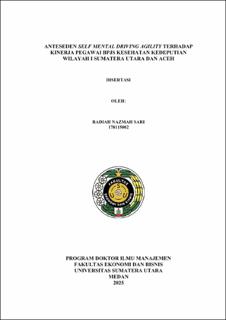Anteseden Self Mental Driving Agility terhadap Kinerja Pegawai BPJS Kesehatan Kedeputian Wilayah I Sumatera Utara dan Aceh
The Antecedents of Self-Mental Driving Agility on Employee Performance at BPJS Kesehatan, Regional Deputy I of North Sumatra and Aceh

Date
2025Author
Sari, Radiah Nazmah
Advisor(s)
Hasyim, Sirojuzilam
Siahaan, Elisabet
Absah, Yeni
Metadata
Show full item recordAbstract
BPJS Kesehatan is a public service institution that plays a vital role in ensuring access to healthcare services for the Indonesian population. As of today, 98% of the Indonesian population are registered participants of BPJS Kesehatan. Therefore, the organization is required to possess resilient, adaptive, and change-ready human resources. However, current conditions indicate that employee readiness for change remains suboptimal, which affects the achievement of performance targets.
This situation is particularly concerning, given that organizational transformation will be difficult to realize without employees’ mental preparedness and adaptive behavior. Thus, it is essential to examine the factors that influence employee readiness for change and performance improvement, including organizational agility, employee agility, and self mental driving agility, particularly in managing change and enhancing employee performance.
This study was conducted on all Assistant Managers of BPJS Kesehatan in the Regional Office I (North Sumatra and Aceh), involving 122 respondents using a census method. The research is grounded in Dynamic Capability Theory as the grand theory, which explains how organizations can rapidly adapt through the renewal and integration of internal resources in response to external changes. As a middle-range theory, Change Management Theory is used. Practically, this study also refers to Performance Theory and Readiness for Change Theory, as well as the concepts of employee agility and organizational agility as key elements in shaping adaptive and productive work behavior.
The analysis results show that organizational agility has a positive but insignificant effect on self mental driving agility. In contrast, employee agility has a positive and significant effect on self mental driving agility. Furthermore, organizational agility significantly affects employee readiness for change, while employee agility has a positive but insignificant effect on readiness for change. Organizational agility also has a positive but insignificant effect on employee performance, whereas employee agility significantly enhances performance.
From the mediation perspective, self mental driving agility is proven to significantly mediate the relationship between employee agility and readiness for change, but not between organizational agility and readiness for change. Additionally, employee readiness for change significantly mediates the relationship between organizational agility and employee performance. Another finding shows that self mental driving agility significantly mediates the effect of employee agility on performance. However, both the direct and indirect effects of employee agility on readiness for change are not significant. These findings emphasize the important role of employee agility and self mental driving agility in improving employee readiness for change and performance at BPJS Kesehatan.
